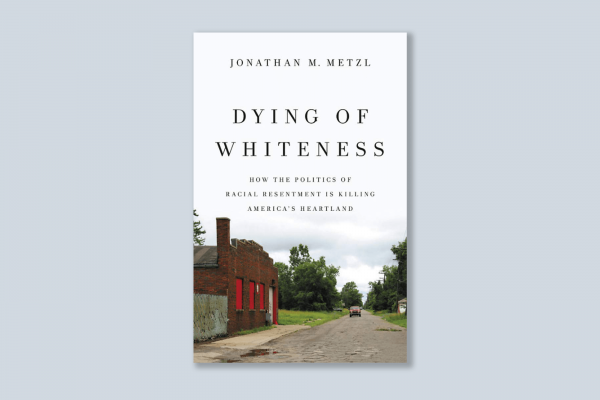IMAGINE A MAN seized by a demon. He cannot be bound by chains or confined within walls. He is a danger to himself and everyone around him. In Dying of Whiteness, Jonathan M. Metzl lays out a compelling case that white folks are so convinced of an ideology of whiteness that we are willing to kill, and even to die, for it. One Christian way to talk about this would be to say that white people are possessed.
In his book, Metzl examines three public health case studies: gun culture in Missouri, particularly white male suicide; the failure to expand Medicaid in Tennessee; and the gutting of public schools under cruel budget and tax policies in Kansas. For each, he calculates the years of life lost because of poor political decisions made under an ideology of white supremacy.
This ideology promotes individual autonomy, downplaying social responsibility and the corporate benefits of working together. The nonfactual fear central to white supremacist ideology is that even though any given white person may need help, there are far more black and brown people who will exploit the system. This fear says white folks must take every precaution to avoid being taken advantage of. In Tennessee, Metzl reports, “many white men ... voiced a willingness to die, literally, rather than embrace a law [the Affordable Care Act] that gave minority or immigrant persons more access to care, even if it helped them as well.”
Metzl thus takes ideology seriously as a factor in his subject’s lives and political choices. They are not victims of misinformation but often sacrifice their health and kids for a vision of autonomy and power that doesn’t satisfy, something Metzl calls, quoting historian Georg Lipsitz, a “possessive investment in whiteness.”
Stylistically, Dying of Whiteness reads like a series of magazine articles united by a loose theme: how white folks are punished by their choice of whiteness. But often the connection does a disservice to the ideas behind the book by keeping Metzl from exploring any element in appropriate depth. Likewise, tying the trauma Kansas suffered with public school funding cuts to public health is weak—as Metzl himself recognizes—but necessary to make the broader theme work. Each individual argument would be stronger if Metzl had the space and time to explore freely, and they don’t gain by being juxtaposed.
So why should Christians care about this? Christ died to free us from sin, which means he died to free all of us, regardless of race, from the demonic power of whiteness. Dying of Whiteness shows us what we’re up against: entrenched ideologies that push people away from life and make them so eager for superiority that they welcome death. The church must make a concerted political, intellectual, and spiritual effort to overcome this darkness. It can be defeated. It will just take an exorcism.

Got something to say about what you're reading? We value your feedback!







